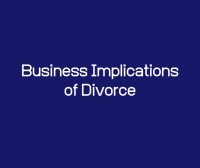When a business owner gets divorced, the business is often the major asset subject to distribution. Accordingly, the business and its’ ongoing operations are almost always implicated in the divorce. In most cases that I see, the business is a small business with one owner or a few owners. In the best case scenario, the business owners have planned in advance for situations that arise in a divorce through a Shareholders Agreement, Prenuptial Agreements and/or Postnuptial Agreements. Hopefully, the parties’ respective family law and business law attorneys can work together to best protect the business owner to ensure as smooth a transition as possible. Hopefully, the relevant agreements have set forth a valuation formula which can be upheld at law for purposes of the divorce. Counsel can also work together to insure that income is clearly defined and reported so that support is less contentious. Additionally, advance planning can be used to address the below issues so that a divorce does not mean the end to the business. While advance planning is not a guarantee, it will provide additional protections to the business owner.
A divorce can impact internal and external business relationships, support (between spouses and child support), equitable distribution (division of marital property) and business control. In terms of business relationships, banking relationships can come into play, especially if the spouse is a personal guarantee of the loan. It is often not easy or possible to have the spouse removed from the guarantee. The spouse may also have a role in the business and it may not be feasible for them to remain involved. For example, in cases where the spouse is client facing, a delicate balance will be necessary to transition the spouse out of the business without negatively impacting the business. This can be a challenge if the divorce is acrimonious. Finally, the roles of the parties within the business may create sustainability issues going forward. In some cases, one spouse has a particular talent (i.e. software development, marketing creativity or scientific knowledge) which cannot be easily replaced and without which the business may not be able to survive. Such issues impact valuation but also succession and strategy on distribution of assets.
As for support, when a business owner is a party to a support action, whether for support for a spouse or for a child, calculating income can be challenging. The definition of income for purposes of determining support is very broad and is not the same as taxable income. There can be practical issues in obtaining information and documents which reflect the income. Legal issues can also arise, such as whether income is being reported or if the court can compel income or retained earnings to be distributed from the business to the owner to pay support.
In equitable distribution, the business must be valued so that division of the assets can occur. Business control also comes into play. It is unusual for parties to retain joint ownership or for the non-business owner spouse to receive shares of the business so creativity and/or structured payments are often necessary unless there is enough cash reserved for an outright payment. The payout can cause a financial strain for the business.
To best protect a business in the event of a divorce of the business owner, it is advisable for business owners to have advance planning through the mechanisms listed above. While not a guarantee, it will place the business owner spouse in a much better position than ignoring these issues all together.





















